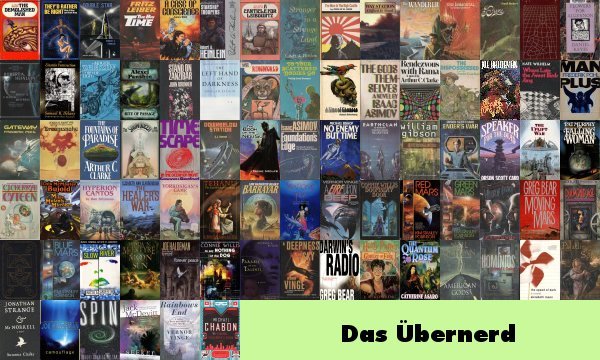That's why I haven't been reading a lot of the biographies that have won the related non-fiction Hugo awards. However, I have read two of them: this most recent winner and the first proper biography that won. (Both King's Dance Macabre and Isaac Asimov: The Foundations of Science Fiction had a biographical section but the first was about horror in general and the second was about Asimov's stories not Asimov himself.)
Now that you know how I feel about biographies in general and can filter my opinions through that let's get on to the books.
 James Tiptree Jr.: The Double Life of Alice B. Sheldon
James Tiptree Jr.: The Double Life of Alice B. Sheldonby Julie Phillips
2007 Hugo Winner for Best Related Non-Fiction
James Tipree exploded onto the scene in the late sixties. He had a style that was radically different from anyone else's and a distinctive, fresh point of view. Tiptree was also a figure of mystery; though he carried on lengthy correspondences no one ever met him, he never attended conventions, or even spoke to him. He hinted that he had a high government position and when Tiptree's writing stalled at the height of Watergate it only made the rumors grow wilder. Suddenly the veil was ripped away to reveal that James Tiptree was actually Alice B. Sheldon, a woman who hadn't started writing science fiction until well into her fifties. After she was revealed her writing continued sporadically until suddenly one night she killed her husband and then herself.
This book is a perfect example of the kind of biographies that I dislike. Phillips decided that Sheldon was a tragic heroine and so casts everything that occurred to her in that light. Sheldon is always presented as the victim in the biography even when her destructive behavior (which was much more than just her last acts) harms those around her.
A perfect example of this is when Tiptree is discovered. When Sheldon's deception is revealed Phillips focuses on only the few preceding years where Sheldon danced around her gender in her letters rather than the years of intentional lies that were used to set up the identity. The responses to the revelation are only her supportive friends with no mention of any hostility. Even when the harm is minimal people feel hurt when lied to for so long but the reader doesn't find any of that. Basically Phillips forgets the lies and ignores any response to the actual deception in order to put Sheldon in the best light possible.
A stylistic touch that I didn't care for was Phillips treating Tiptree as a separate person than Sheldon, but even in the text it is clear that Tiptree was a role Sheldon affected rather than a complete personality. Sheldon was conflicted and trying to keep her science fiction writing separate from the rest of her life however trying to split them into distinct individuals was a step too far.
I disliked The Double Life of Alice B. Sheldon quite a bit. The story of Tiptree is one of the most unique ones in the history of science fiction (and when you consider science fiction authors that's really saying something) and despite flashes of interest I felt the structure didn't really give me a view of Sheldon's life. The best thing I can say about it is that it explores the sources of Sheldon's stories very well and that isn't enough to make it worth while.
 Wonder's Child: My Life in Science Fiction by Jack Williamson 1985 Hugo Winner for Best Related Non-Fiction
Wonder's Child: My Life in Science Fiction by Jack Williamson 1985 Hugo Winner for Best Related Non-FictionWonder's Child by virtue of being an autobiography doesn't have the same tone problems but it reads like a set of anecdotes from a friendly uncle. Williamson made his first story sale to Hugo Gernsback in 1926 and proceeded to have a career writing science fiction that went off and on for nearly eighty years (his last book before his death was published in 2005).
I'm not a fan of Williamson but I appreciated his honesty in his autobiography. In his discussion of his writing for the pulps he makes it clear that he spent a lot of time mimicking other authors. Many early science fiction authors did but I don't recall any being so open to discussing who's ideas they were reworking.
I said the book reads like anecdotes but they are of the rambling kind that shift into digressions and back again. Williamson's youth is the focus of Wonder's Child, three-quarters of the book takes things up to 1950 but I didn't mind that since the portion I was most interested in were the remembrances of those pulp magazines.
Still I can't recommend Wonder's Child. It left me feeling ambivalent, I didn't really like it but I wasn't left annoyed or disliking it either. I'd say that the dividing line for readers is going to be if the like Williamson or are interested in the pulps. If you are then you may find something of interest in Wonder's Child but if you don't then it will leave you bored.
